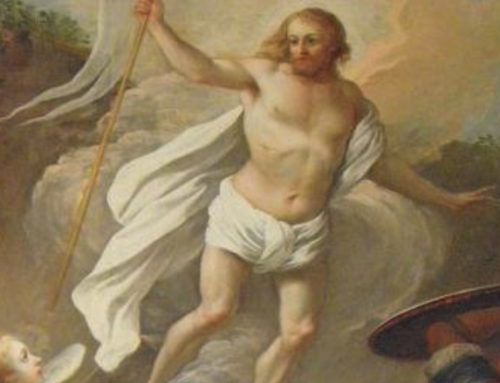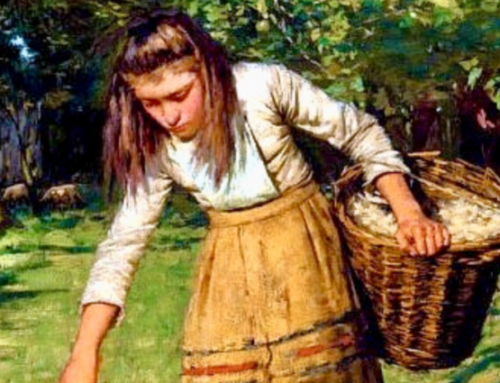Whit Stillman’s Love & Friendship is a magnificent Jane Austen adaptation, not least because it conceives of the perfect ending for the unpolished project of Austen’s juvenescence, Lady Susan. This is Jane Austen, and it is a comedy, so of course there must be a wedding at the end. But how does one best pull that off?Mr. Stillman succeeds. And his solution is unmistakably a literary one. When Reginald DeCourcy marries his bride at the end, he reads a poem that he himself has allegedly composed for her. Not only that, but in a self-reflexive way, Mr. Stillman the scenarist is also speaking at this moment through Reginald (hence my use of the word “allegedly”). This instance of indirection seems clear enough, because the poem summarizes the very meaning of the story, of its Austenian preoccupation with the cultivation of virtue, which we have just watched unfold on the screen:
Blest tho’ she is with ev’ry human grace,
The mien engaging, and bewitching face,
Yet still an higher beauty is her care,
Virtue, the charm that most adorns the fair.
To reinforce Reginald’s spoken text, the film also writes these words across the screen as Reginald declaims them.
Yet Mr. Stillman is speaking through Reginald not unambiguously. True, he is serving up a happy ending for Janeites who want to see virtue vindicated at the expense of the irresistibly charming but rapaciously amoral Lady Susan. Yet, in the deployment of this poem, we also witness an artistic stroke of genius on Mr. Stillman’s part. Because an ambiguity remains: How are we to interpret these words? Are we to take them at face value? Or does not the wedding at the end fit perfectly with the many ironies and deceptions laced through the storytelling? Perhaps Lady Susan is still triumphant here, as the self-satisfied look on her face in the moment seems to suggest.
Ultimately, we are invited to ponder whether these concluding poetic words are themselves to be understood ironically. After all, we have just spent an hour and a half learning about the secret character of Lady Susan Vernon (unforgettably portrayed by Kate Beckinsale, who has never been more impressive on the silver screen) and what Lady Susan keeps hidden from the whole world, save for her close friend and confidant, Mrs. Alicia Johnson (played by Chloë Sevigny). What we have learned is that Lady Susan can gaslight anyone and get her way. Perhaps at the end of this film, then, she has done nothing less than perfectly accomplish all things in accordance with her will. This thought is, I believe, meant to haunt us.
For Mr. Stillman is a master of irony. And the fact that he is a master of irony is reinforced by the extra layer he adds in the novel version of his film, Love & Friendship: In Which Jane Austen’s Lady Susan Vernon Is Entirely Vindicated (Little, Brown and Company, 2016). The novel’s text preserves every memorable word uttered in the film, such that any reader with a copy can pleasurably relive the movie at will. Not only that, the novel adds multiple layers of new comedy, as the narrative is entrusted to a nephew of Lady Susan, the hilariously named Rufus Martin-Colonna de Cesari-Rocca, who writes to vindicate her. Never has a movie had a more riotous or a more rewarding “bonus feature.”
In Mr. Stillman’s novel, Rufus Martin-Colonna de Cesari-Rocca is writing in opposition to the “spinster authoress” (namely, Jane Austen, whom he never calls by name, but whom the reader understands to be the ongoing object of Martin-Colonna de Cesari-Rocca’s pedantic wrath and aristocratic scorn) and in opposition to her distorted epistolary account of Lady Susan’s life. But the running gag is that every clumsy attempt by this fictional author to vindicate his aunt ironically succeeds in convincing the reader otherwise. If this author had tried to write an impartial history of Lady Susan sine ira et studio, there would have been no comedy generated by the multiple ironies. As it is, there are new laughs on practically every page of Mr. Stillman’s novel. My own favorites are usually those generated by Martin-Colonna de Cesari-Rocca’s ridiculous but wildly entertaining footnotes.
Let us return to the ending of the film. Should we interpret it ironically? Regarding the wedding poem at the story’s conclusion offered by Reginald (about “Virtue, the charm that most adorns the fair”), the fictional author of Mr. Stillman’s novel makes snide comments, casting doubt on Reginald’s ability to write such a poem. Martin-Colonna de Cesari-Rocca twice implies that Reginald has plagiarized the poem: “Re-reading these verses now, decades later, I am struck by their quality. The question arises, were they Reginald DeCourcy’s own, or might he have found ‘inspiration’ from other sources? In any case, when he concluded, those present applauded his (or someone’s) beautiful composition.” (p.149)
Not only is this peevish criticism from Martin-Colonna de Cesari-Rocca a typically hilarious detail inserted by Mr. Stillman, it is also most intriguing. I take it as the key, cleverly planted, to interpreting the cinematic ending. Because Mr. Stillman is a master at linking smaller details with the wider construction of his plots, I first took Martin-Colonna de Cesari-Rocca’s remark as an indirect admission by Mr. Stillman that he himself had plundered these lines from another source. Furthermore, I then aimed to track down the original source that Mr. Stillman had drawn them from, in the hope that we might have a telling clue about how to interpret the end of the film.
In other words, I sought to settle this question: Should we take the movie’s concluding celebration of virtue to be perfectly ironical, and thus a perfect cinematic vindication of Lady Susan (unlike the imperfect “vindication” attempted by Martin-Colonna de Cesari-Rocca that, in the novel, comically fails to succeed)?
Thankfully, due to an easy approximation of Googlewhacking, I didn’t have to look far to discover Mr. Stillman’s source for the poem. As it turns out, it is perfectly historical and perfectly authentic. It comes from an actual wedding announcement made in the Massachusetts Gazette on June 20, 1774. Mr. Henry Knox of Boston is to marry Miss Lucy Flucker and, as was “a common custom of the times, a friendly poetaster composed these epithalmic lines to accompany the formal announcement of marriage:”
Blest tho’ she is with ev’ry human grace,
The mien engaging, and bewitching face,
Yet still an higher beauty is her care,
Virtue, the charm that most adorns the fair;
This does new graces to her air inspire,
Gives to her lips their bloom, her eyes their fire;
This o’er her cheek with brighter tincture shows
The lily’s brightness and the blushing rose.
O may each bliss the lovely pair surround.
And each wing’d hour with new delights be crown’d!
Long may they those exalted pleasures prove
That spring from worth, from constancy and love.
In the novel, Mr. Stillman quotes the first four lines and the last two. I supply the rest here for the reader’s interest, and also to reinforce my firm conclusion that the quotation is being made without irony. Yet Mr. Stillman does so gently, leaving one free to take things that way if one wishes. Nonetheless, because my quotation above is from Noah Brooks, Henry Knox: A Soldier of the Revolution, Major-General in the Continental Army and Washington’s Chief of Artillery (New York: Cosimo, 2007 [1900]), p.24–25, I think we may conclude that, because the reference is being made to an American military hero and a friend of George Washington (many a town and many a city, not to mention Fort Knox, was named after him), a virtue-based marriage is being truly celebrated.
In other words, the spinster authoress is entirely vindicated.







Leave A Comment